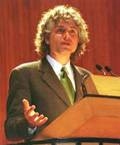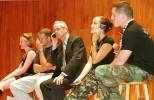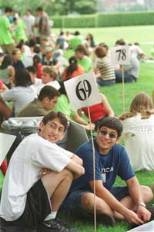After being voted out of a student skit spoofing the TV show "Survivor," President Charles M. Vest officially welcomed the Class of 2005 to MIT on Thursday morning in convocation ceremonies at Kresge Auditorium.
"This is Day One of a relationship that we hope will enrich you for the remainder of your life--a relationship with our faculty, staff, graduate students, returning undergraduates, our alumnae and alumni, and each other," President Vest said.
The 1,034 freshmen from 46 states began an intensive 11-day orientation program on Wednesday that includes lots of food and fun--a dance, scavenger hunt, hypnotist's performance, movies, and visits to museums, Fenway Park and the Big Dig.
"You are a member of the freshman class at MIT because we believe--we know--that you have the intelligence, the energy, the imagination and the personal will to succeed here," Vest said. "You have the right stuff. We are very proud and excited to have you as students, and I hope you are proud and excited to be here."
Keynote speaker Steven Pinker, the Peter De Florez Professor of Psychology in the Department of Brain and Cognitive Sciences, followed Vest to the podium. Noting that he was asked to discuss race and diversity although his area of research is language, he challenged the audience with a puzzle about changing words for ethnic groups.
Why have the San Diego and Boston city councils recently banned the word "minority" as derogatory, when its literal meaning is neutral? He suggested this exemplified a "euphemism treadmill," in which a word for an emotionally charged concept is replaced, in hopes of redefining people's attitudes toward the concept. But instead, the new word becomes tainted, prompting the search for yet another fresh word, and so on.
Pinker said linguists had already noted the process with concepts as diverse as toilets ("lavatories, bathrooms, restrooms"), disabilities ("crippled, handicapped, disabled, challenged"), and old folks ("elderly, golden agers, senior citizens"). Thus, "Negro" became "black," which led to "African-American"; "Oriental" became "Asian"; "Hispanic" became "Latino." This shows that changing a word is not enough to change attitudes, and indicates how far we have to go in achieving racial progress, he said. "We know we will have achieved equality and mutual respect when terms for ethnic minorities stay put."
Dean for Undergraduate Education Robert P. Redwine and Undergraduate Association President Jaime E. Devereaux also addressed the freshmen.
Redwine advised them to seek help--from advisors, faculty and fellow students, among others. "MIT is a very collaborative place," he said, suggesting several opening ploys, including inviting a professor to lunch ("the professor may offer to pay").
Devereaux, a senior majoring in aeronautics and astronautics, noted the important role that naps play in student life and listed 10 places on campus to catch up on rest, starting with Killian Court. "Enjoy the free food," she said, "and try to get some sleep."
The orientation program also included sessions on diversity, sexual assault, intimate relationships and alcohol.
The diversity program, entitled "Build Your Own Dome: How to Get the Most Out of MIT," took place Friday morning. It was sponsored by the Committee on Campus Race Relations. This was followed by "No--Yes," a discussion on sexual assault and college life led by Katie Koestner, founder of Campus Outreach Services. The Academic Expo at which students met with faculty members to discuss academic departments and special programs for freshmen was held in the Johnson Athletic Center on Friday afternoon.
On Saturday morning, Jay Friedman, a certified sex educator, directed a program entitled "Sex Matters" in Kresge Auditorium.
On Friday, Aug. 31, Mike Green, an alcohol awareness speaker, will discuss college drinking and strategies for situations involving alcohol use. The session, sponsored by the InterFraternity Council, is scheduled for Kresge Auditorium from 5 to 6:30 p.m.
'SURVIVOR' THEME
The "Survivor" spoof was established as a theme for orientation right from the start.
At opening ceremonies Wednesday night, a voice rose through the darkness in Kresge Auditorium, advising freshmen that although the "next few years will be spent scouring ancient texts and listening to even older professors," the goal right now was to have fun.
Then a home-made video on the big screen introduced the four orientation coordinators--senior Roxanne Cartwright, juniors Michael Ramos and Trisha McAndrew, and sophomore Alex Forrest--showing them at play and engaged in funny, quirky interactions.
When the video ended and the lights came up, the four stood on stage, mikes in hand, wearing coordinated camouflage outfits and looking like a pop group ready to rock.
Instead, they called randomly selected freshmen to the stage, including three teams building a stretcher to carry in Dean of Students Larry Benedict; an on-stage "Who Wants to Be A Millionaire"-type quiz; and a brief talent segment during which one brave young man turned a cartwheel in front of his new classmates.
MORE THAN JUST A SCHOOL
Dean of Admissions Marilee Jones drew a murmur from the crowd when she told the freshmen that their applications had been reviewed not once, twice or thrice, but five times. "MIT is not just a school," she said. "It's a concept." In contrast to orientation at other schools where students were being told they'd inherit the earth after graduation, she said, "when you graduate from MIT, you'll fix the earth--for those who can't fix it themselves."
Her suggested mantra for freshman year: "I'm perfect the way I am. I'm in the right place, at the right time, doing just the right thing."
Benedict offered his own plan for surviving freshman year: "Balance, connection--reach out and connect with someone besides your roommate--and sleep."
A version of this article appeared in MIT Tech Talk on August 29, 2001.











